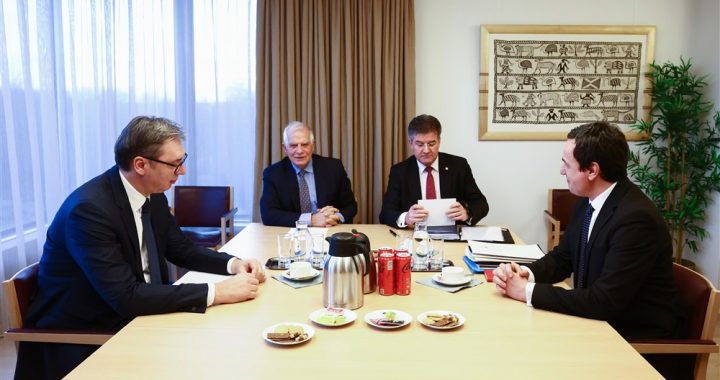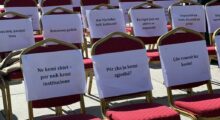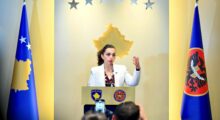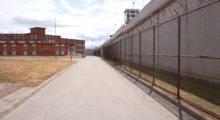Opposition parties in Pristina and Belgrade accused their respective countries' leaders of betrayal after they tentatively agreed on a EU plan for the normalisation of relations between Kosovo and Serbia.
Kosovo and Serbia’s leaders Albin Kurti and Aleksandar Vucic broke their deadlock on Monday evening by tentatively agreeing a European Union plan on the normalisation of relations between the two countries but opposition parties in Pristina and Belgrade expressed discontent about the agreement.
Kurti and Vucic met in Brussels on Monday evening to discuss the plan, which was put on the table by EU foreign policy chief Josep Borrell.
“This is an important and significant development because since last summer, we have been involved in crisis management, focusing only on crises: one crisis after another, trying to control the tensions on the ground,” Borrell told media after the meeting.
Nothing has been signed yet, although the EU has published the agreement on its website. It is expected that the EU’s envoy for Belgrade-Pristina dialogue, Miroslav Lajcak will visit the two countries in the coming weeks, while the next Kurti- Vucic meeting is expected to be held on March 18 in Skopje, North Macedonia.
Vucic said on Tuesday that he battled to protect Serbia’s interests at the Brussels meeting.
“We fought as much as possible in difficult conditions and fought for the future of Serbia in peace, for the continuation of investments in our country. And I also keep my oath and the constitution of Serbia and Kosovo and Metohija as part of Serbia,” Vucic said.
He has previously emphasised that before signing any agreement, he needs to see an implementation plan for an Association of Serb-Majority Municipalities, a planned body to represent the Kosovo Serb community’s interests that was agreed in a previous deal signed in Brussels in 2013 but has not yet been implemented.
Kurti said Monday’s meeting was “constructive”.
“The meeting was a confirmation that the EU proposal is acceptable and unchanged. The way forward is the implementation plan and we will have another meeting in mid-March with Borrell and Lajcak’s mediation,” Kurti said after the meeting.
The 11-point agreement on the path to normalisation between Kosovo and Serbia says that they should develop normal, good-neighbourly relations with each other on the basis of equal rights.
It also says that Kosovo and Serbia should mutually recognise their respective documents and national symbols, including passports, diplomas, vehicle licence plates and customs stamps.
On the subject of international representation, the agreement says that the parties should proceed on the assumption that neither of the two can represent the other in the international sphere or act on the other’s behalf.
“Serbia will not object to Kosovo’s membership in any international organisation,” the agreement says.
Although it does not specifically mention the heated issue of the Association of Serb-Majority Municipalities, the agreement says that Kosovo and Serbia should implement all past agreements, which remain “valid and binding”.
The agreement also says that specific arrangements and guarantees should be established to ensure an appropriate level of self-management for the Serb community in Kosovo and the ability for service provision in specific areas, including the possibility of financial support from Serbia and a direct communication channel for the Serb community to the government of Kosovo.
The agreement further states that the status of the Serbian Orthodox Church in Kosovo should be formalised and a strong level of protection should be given to Serbian religious and cultural heritage sites.
A joint committee, chaired by the EU, is expected to be established for monitoring the implementation of the agreement.
Opposition politicians furious over Kosovo recognition issue
In Prishtina, Memli Krasniqi, the leader of the biggest opposition party, the Democratic Party of Kosovo, PDK, accused Prime Minister Kurti of avoiding the key issue of Kosovo’s recognition by Serbia.
“We should say it loud and clear: it is officially evident now the European proposal does not include mutual recognition as a criteria for normalisation of relations between Kosovo and Serbia and opening up a European perspective for our country,” Krasniqi said.
Another opposition party, the Democratic League of Kosovo, LDK, took the same tone.
“This agreement is not final and does not include mutual recognition. In addition, it includes interpretative ambiguity on the political status of both countries. Everything except recognition was Serbia’s goal. This agreement which has been accepted by both sides has everything except recognition,” the LDK said.
However, the deal was supported by opposition leader Ramush Haradinaj of the Alliance for the Future of Kosovo, AAK, who called it “a big achievement”.
“The agreement is a factual admission of Kosovo’s independence which returns [Kosovo] to political and security normality, a Euro-Atlantic perspective and new recognitions [of its independence],” Haradinaj said.
In Belgrade, Milica Djurdjevic Stamenkovski, leader of right-wing party Zavetnici, which won 3.8 per cent of the vote in the 2022 elections, said that the Brussels talks showed that Vucic is prepared to “give Albin Kurti a state” if the Association of Serb-Majority Municipalities is formed.
“They have reached the point where they now present self-governance for the Serbs in ‘independent Kosovo’ as a success,” Djurdjevic Stamenkovski said on Monday evening.
The other right-wing parties who have seats in the Serbian parliament – Dveri and the New Democratic Party of Serbia, DSS –also criticised the agreement, claiming it clearly accepts Kosovo’s independence.
Opposition leader Zdravko Ponos, who won 18 per cent of votes at the presidential elections in 2022, being second behind Vucic, said on Tuesday that the agreement essentially recognises that Kosovo is an independent entity in international relations, in other words a state.
“This paper changes everything, regardless of what Vucic has done so far and what he will do in the future, he will be remembered only for this – that is what history will remember him for,” said Ponos.
Zorana Mihajlovic, a pro-Western politician and former minister in Vucic’s government, argued however that the agreement does not mean the recognition of Kosovo, nor “betrayal” as some representatives of the opposition and the ruling majority, are trying to claim.
“It is a decision that should bring about what everyone has been advocating for years – peace, coexistence, a better life for Serbs and Albanians,” Mihajlovic wrote on Instagram.
Serbian Prime Minister Ana Brnabic also wrote on Twitter that opposition politicians have been making Serbia’s position difficult in the negotiations between Belgrade and Pristina in the “hope of creating a millimetre [of space] for themselves to come to power”.
























